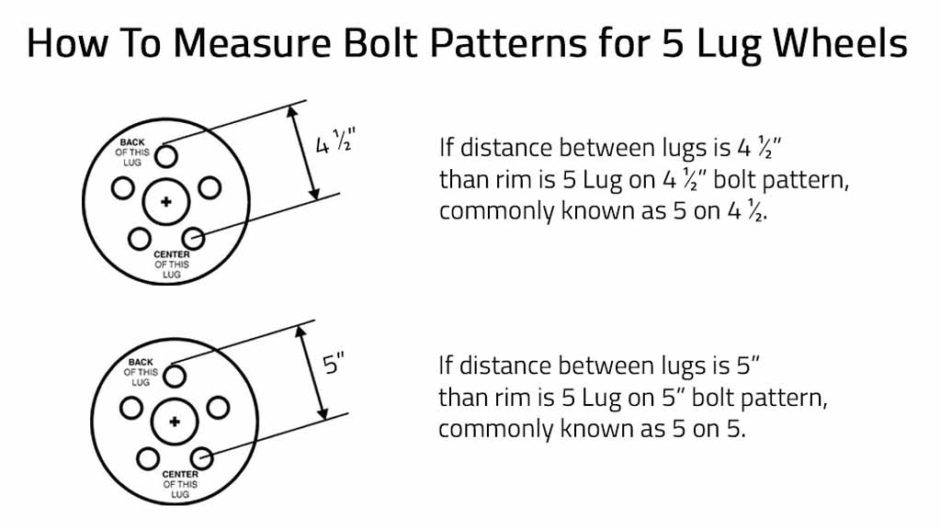Decoding Your Wheels: Mastering the 5-Stud Pattern Measurement
Ever found yourself staring at a set of shiny new wheels, wondering if they'll fit your ride? One of the most critical factors in wheel compatibility is the bolt pattern, especially the common 5-stud configuration. Knowing how to determine your 5-stud wheel bolt pattern is essential, whether you're upgrading to aftermarket rims or simply replacing a damaged wheel. This seemingly small detail can prevent a world of headaches and ensure a safe, smooth ride.
Understanding your 5-stud wheel pattern isn't just about aesthetics; it's about safety. An incorrect bolt pattern can lead to loose wheels, vibrations, and even catastrophic failure. Imagine cruising down the highway, only to have a wheel detach! By learning this simple measurement technique, you'll be taking a proactive step towards ensuring your vehicle's roadworthiness and your own peace of mind.
So, what exactly is a 5-stud wheel pattern, and why is it so important? It refers to the arrangement and spacing of the lug holes on your wheel hub. These holes correspond to the studs on your vehicle's axle, securing the wheel in place. The 5-stud pattern is particularly common in passenger cars and light trucks. Accurately measuring this pattern is the key to ensuring proper fitment and avoiding potential dangers.
Historically, wheel patterns have evolved alongside vehicle design and engineering. As cars became faster and heavier, the need for secure wheel attachments grew. The 5-stud pattern emerged as a reliable and efficient solution, providing a balance between strength and weight distribution. Today, various 5-stud patterns exist, differing in the diameter and spacing of the lug holes. This variation necessitates accurate measurement to ensure compatibility.
The main issue surrounding 5-stud wheel pattern measurement is the potential for error. Inaccurate measurements can lead to purchasing the wrong wheels, resulting in wasted time and money. Furthermore, forcing an ill-fitting wheel onto your vehicle can damage the studs, hubs, and even the wheels themselves. This guide aims to eliminate these issues by providing a clear and concise method for obtaining precise measurements.
To measure a 5-stud pattern, you'll need a ruler or caliper. For patterns with an odd number of studs like 5, measure from the center of one stud to the center of the stud directly across from it. This measurement is the diameter of the bolt circle, often expressed in millimeters. For example, a common pattern is 5x114.3, indicating 5 studs with a 114.3mm bolt circle diameter.
Benefits of knowing your 5-stud wheel pattern: 1) Ensures proper wheel fitment, avoiding vibrations and potential detachment. 2) Saves money by preventing the purchase of incompatible wheels. 3) Enhances safety by ensuring secure wheel attachment.
Step-by-step guide: 1) Locate the center of a stud. 2) Measure to the center of the opposite stud. 3) Record the measurement in millimeters.
Advantages of accurate measurement: Safe and proper wheel fitment. Disadvantages of inaccurate measurement: Potential wheel detachment, damage to vehicle components, wasted money.
Best Practice: Always double-check your measurements. Consult a professional if you're unsure. Refer to your vehicle's owner's manual for the correct bolt pattern.
Real Example: A car owner wants to upgrade their wheels. They measure their 5-stud pattern as 5x114.3 and purchase compatible wheels, ensuring a perfect fit.
Challenge: Difficulty measuring across the hub. Solution: Use a caliper for more precise measurements.
FAQ: 1) What is a bolt pattern? (The arrangement of lug holes). 2) How do I measure a 5-stud pattern? (Measure center-to-center of opposite studs.)
Tip: Clean the wheel hub before measuring to ensure accuracy.
In conclusion, understanding and accurately measuring your 5-stud wheel pattern is paramount for safe and efficient vehicle operation. By mastering this simple skill, you'll be empowered to make informed decisions when selecting new wheels, preventing potential hazards and costly mistakes. Knowing your wheel pattern ensures proper fitment, enhances safety, and ultimately, provides peace of mind on the road. Don't underestimate the importance of this seemingly small detail – it's a fundamental aspect of vehicle maintenance that every car owner should grasp. Take the time to measure your wheel pattern correctly, and you'll be rewarded with a smooth, safe, and confident driving experience.
Mastering your starbucks app gift card integration
Conquering concrete caked in spray foam
Engaging activities for thriving fourth graders













